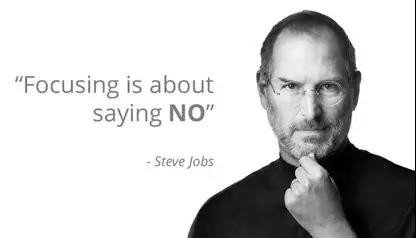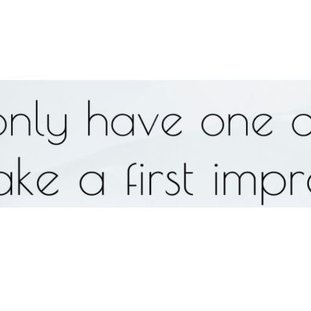Home > Content > Blog > Focus means saying No
Focus means saying No

THIS IS A GOOGLE TRANSLATE VERSION OF A BLOG IN CHINESE BY Kai Fu Lee
I only know of him as a thought leader and have not got his permission to post this. This is NOT something I have written - sharing since a lot of the points here are valuable!
Recently, a young friend asked me to ask: Kaifu, I can hardly refuse others. Sometimes I know that I am already busy, or that I should not do one thing, but in the face of a partner, I still can't tell the truth.
“Rejecting others, I need a lot of mental construction. But often the moment I started, it turned into yes!”
In fact, this friend's confusion is not uncommon. I have met many such friends. They are usually very friendly and very popular with colleagues, but the efficiency is not necessarily high. There are several key points to changing this habit.
First, cognition: refusal is to "focus"
Many people think that refusing partners will make each other's relationship awkward, but it is not. A reasonable rejection sometimes makes the team more efficient and uses the energy in the most critical places.
Steve Jobs once said that focus is to say "no." This means that to be successful, you should focus on what you have to do, rather than adding more to your to-do list to reduce the quality of all your work.
However, in the handover of actual work, saying "no" is not an easy task. Why do people always tend to say "good"? How to say "no" is easier for others to accept?
Second, "good old people": cater to personality disorder
According to the concept of "mirror self", the sociologist Mead points out that the concept of "self" is not how others actually evaluate us, but how we feel others evaluate us - that is, the self in my eyes, the actual It’s the one I saw in my eyes.
People always live in the eyes of others who are imaginary, so they value their evaluation and preferences. People naturally want to be recognized by others, and hope to confirm their social status and value through the affirmation of others. The unbearable rejection of the request of others is a manifestation of the individual's desire to gain the goodwill of others. Many times we want to say "no" because we are afraid of disappointing colleagues, leaders, losing team value or even losing our jobs. In the end, we often say "good."
Although this is a natural psychological tendency, if it forms a mindset that pleases people's recognition, it will fall into the definition of “challenging personality disorder” in the definition of psychology, a kind of strong self-sacrifice component leading to interpersonal relationship. The conflicts in the relationship are also deeply painful obstacles. They are often "good old people" in interpersonal communication. They are willing to help others, understand people's wishes, and have great tolerance for other people's mistakes. They try their best to satisfy other people's requests, but only if they hope to gain recognition or gratitude from others. In order to maintain a good image at all times, as long as someone makes a request or invitation, no matter how much trouble, unhappiness and high cost it will bring to them, they will still accept it without any principle. Because they don't want to see each other's anger and dissatisfaction, psychologists call this "conflict avoidance" because they see conflict and dissatisfaction as dangerous emotional experiences.
Third, naturally and mildly say "no"
First of all, we must psychologically recognize that saying "no" is a natural and necessary thing. Shawn Achor explains in the book Before Happiness: "Although the human brain receives 11 million messages per second from the environment, it can only process 40 bits per second. This means that the brain must make choices and only handle the input. Part of the tiny proportion of information, a lot of information is selectively ignored. Your reality is a choice, you choose to focus on shaping the world you perceive and interpret." Therefore, the choice to say "no" should be a very Natural things, our brains are doing this all the time.
But in the work, the word "no" is usually related to negativity, and saying "no" requires some skill. In order to prevent yourself from being overwhelmed by work that should be rejected or postponed, there are several points to note when and how to say "no":
1. Don't reply without thinking
As human beings, we tend to be satisfied immediately rather than "delayed satisfaction." This means that we tend to be short-sighted and do not see the consequences of saying "good" immediately.
Please take the time to consider the consequences of “good” and ask yourself, “Do I have free time?” and “What is more important? It was originally scheduled in the schedule, or this new project”.
When your boss or colleague asks you to help them complete a new project, don't hesitate to agree immediately. A more reasonable answer is to tell the boss or colleague that you will check your schedule and then give them a reply as soon as possible.
2. Learn more about the request
Before blindly refusing, you should probably ask a few more questions to understand the urgency and importance of other people's requests.
“What do I need to do specifically?”
“Is it urgent? Can this wait?”
“Can anyone else help?”
Only by knowing what you are specifically asked to do can you coordinate time and make trade-offs according to your own abilities and arrangements.
3. Seek help to prioritize
In the work, the priorities of each project are different. What do you think must be done first, may not be the same as the team's ideas.
Therefore, when someone invites you to join a new project that conflicts with the existing work schedule, and you are not sure which one is more important, you should actively communicate with the team and seek help to prioritize. If the boss thinks you can postpone another project, then please devote yourself to the newly arranged event.
4. Steps to say "no"
When you decide to say "no" to someone else's request, you can take the following steps to make your rejection easier:
First, call someone else's desk or communicate face to face. This will make the attitude more sincere, and avoid the misunderstanding that the blunt text message is easy to cause due to the lack of tone.
In the conversation, perhaps you should first thank others for considering this project for you, rather than enumerating how much work you have done. Then, share your current schedule and priorities, explain the need to complete the project you choose, and truthfully explain the stakes and let the other person know about your situation. Finally, I am sorry for the inability to help. A sincere and skillful refusal will give you the understanding of the other party.
No choice is perfect, any choice means giving up something else. No matter how you do it or how to choose it, there will be regrets. In the long run, learning to say "no" will make you a more focused and efficient person.
About the Author -
Sanjay Swamy is an Entrepreneur & Early-Stage Fintech Investor! #DigitalPayments & #Financial Services Fanatic! #IndiaStack_Evangelist!
This article was originally published on Linkedin
Recommended articles
View AllBuilding A National InterOperable Payments BRAND for India!
“GooglePay or Cash” was something a Taxi Driver told me in Mumbai yesterday. A small merchant says “PhonePe or Cash”. …
Read MoreMaking a Lasting First Impression!
How to have a high-quality first meeting with a VC!
I meet new entrepreneurs daily. Unfortunately most meetings are terrible …
Read MoreIf you believe you are building the next big thing, let’s make it happen.





